- Home
- Jean Stone
Trust Fund Babies Page 2
Trust Fund Babies Read online
Page 2
Alzheimer’s disease.
The diagnosis had given Mary Beth an odd sense of freedom, as if the only responsibility to her mother now was financial. Gone was the need to accompany Dorothy to the Riviera each spring to sit and sip gin on the Promenade des Anglais and listen to the same stories of how grand Nice once was; gone was the duty as cohostess for Dorothy’s Vineyard soirées, which meant Mary Beth did the planning and Mary Beth did the work, while her mother entertained on the veranda in a wide-brimmed summer hat and played whist like the southern belle she was not.
None of which meant Dorothy was a prima donna. It was simply the way things always had been done.
Along with the disease came the transfer of her mother’s funds into Mary Beth’s, though Dorothy’s dollars alone were not enough for the support payment of fifteen thousand a month. She could have gone somewhere cheaper, but it would not have been right. Old money was expected to choose Harriman House; it wasn’t Dorothy’s fault that though her cash would have been ample back in the sixties, it was worth squat in the new millennium.
But relieved of the bittersweet burden, Mary Beth was only too happy to kick in the balance from her own Atkinson trust fund … just one more off-ramp on the superhighway of comings and goings of her inheritance.
Her mother sat on a flower-cushioned rattan chair next to a willow tree. Despite the fact that Dorothy had a full suite with fine furnishings, she preferred open places, where people passed by and nodded and smiled as if they knew she was Dorothy Atkinson-McKnight—society’s Deb of 1955. Maybe today, the Deb would recognize her daughter. Maybe, maybe not.
Mary Beth sucked in her breath. “Hello, Mother,” she said, and stooped to give her a perfunctory hug. A gentle scent of lavender soap reassured Mary Beth that bringing her mother there had been right, for she was well cared for, she was treated with dignity, as the brochure had promised.
Dorothy blinked but did not reply.
Mary Beth sat on a twin rattan chair and eyed the crisp ruffled robe that looked as sparkly bright as the woman who wore it was not.
“Mother?” she repeated, but Dorothy said nothing. Mary Beth squared her shoulders. Would she ever be able to accept that the woman who looked a lot like her mother was somehow detached from her mind? Lately, however, it was equally startling when Dorothy knew who Mary Beth was. But it was the uncertainty that was most difficult: which personality would emerge in the crisp, ruffled robe today, any day?
She leaned over. “Mother, it’s me. Mary Beth. I’ve come for a visit.”
Dorothy looked at her, then looked away. Mary Beth looked in the other direction, trying to ignore the tingle that rose in her throat and threatened to turn into tears.
“I went to Tiffany’s this morning,” she said, raising her chin, as if they were having a real conversation, as if it were ten years or five or even six months ago, when Mary Beth had shared every drop of life—hers, theirs, and everyone else’s—because it entertained Dorothy and, over time, that had become Mary Beth’s job. “I bought bubble wands, Mother. They are sterling, of course, and will be engraved …” Her voice had gone flat, stripped of its enthusiasm.
“Nurse,” her mother cried weakly.
Mary Beth dared a glance back at Dorothy. A single tear leaked from her eye. “It’s okay,” she whispered. “I’m not going to hurt you.”
Her gaze fell to the five-carat diamond that loosely ringed the blue-veined finger of her mother’s right hand, the engagement ring given to Dorothy by Mary Beth’s father. He was a faceless man whom Mary Beth had forgotten through her own form of Alzheimer’s-for-the-young—a welcome insulation against recollection of all things unpleasant.
“What’s the trouble, Dot?” The woman who asked was the occupational therapist Mary Beth had seen often. She was a boxy brunette with red lipstick and drawn-in arches where her eyebrows should have been. She wore a blue smock and reminded Mary Beth of an old-fashioned hairdresser, the kind who smoked cigarettes between bleaching blondes and setting hair in pink rollers. Cigarettes, Mary Beth thought. What she wouldn’t give for a pack or two now.
“Dot” did not answer the therapist, either. Mary Beth refrained from suggesting that the woman not call her mother Dot. It was bad enough Dorothy often did not know her own name; changing it could only add to the poor woman’s confusion.
Then again, she reminded herself, Dorothy—Dot—was no longer her responsibility.
“Did you bring the photos?” It took Mary Beth a second to realize the question was directed at her, not at “Dot.”
“No,” she replied. “Not today.”
The therapist nodded as if she wasn’t surprised. Mary Beth smoothed the lap of her black linen skirt, which a short time ago had seemed so couture and now seemed only foolish. Who went to a nursing home, no matter how pricey, dressed for lunch at a Parisian café? The same woman, she supposed, who had forgotten the occupational therapist’s suggestion that had come from the doctor to help Dorothy sort through old photographs.
“We encourage residents to get in touch with their past,” the gerontologist had said. “Their earlier memories are much stronger than recent ones.”
But Mary Beth, of course, had not remembered the photos because Mary Beth was too busy these days. She swallowed her guilt. “I’ll bring them next time.”
The therapist threw a steely-eyed stare, as if it were Mary Beth’s fault that Dorothy was here in the first place. “Pictures will remind her of home,” the woman said with a grunt.
Mary Beth did not mention that except for the rare antiques and pricey bric-a-brac, Dorothy’s “home”—the grand apartment on Central Park West—no longer had much left of Dorothy, that her bedroom and dressing room had been converted to a small gym and a steam room. She did not say that because Dorothy might become lucid and might understand that she now was, officially, a ward of Mary Beth’s, that her choices were no longer her own.
“I need a dress,” Dorothy said suddenly. “When will you buy me a dress for the wedding?”
Mary Beth turned back to her innocent, white-haired mother. “Soon, Mother.” There was no reason to tell Dorothy she couldn’t go to Shauna’s wedding because it would be awkward to have her in public, most of all among friends.
Her mother’s pale eyes seemed content with the answer. Then she smiled. “Where is my breakfast?” she asked. “I’d like my breakfast.”
Mary Beth stood up. “You ate breakfast hours ago,” she replied, then glanced at her watch. “Well,” she said, “I have to get going.”
The therapist looked Mary Beth up and down, then leveled her eyes with blatant disapproval. “The photos really would help,” she repeated.
“All right,” Mary Beth said through her teeth. “I said I’ll bring them next time.” She kissed the translucent skin of her mother’s dry cheek, tossed her bag over her shoulder, and marched away, reminding herself that she was the one who paid the fees that paid the damn therapist’s salary, and that she must inform the administrator what kind of behavior from the staff was appropriate and what, goddamnit, was not.
When she steamed into the lobby on Central Park West, Mary Beth was still sputtering.
Damn the paid help who thought they had all the answers.
Damn the fact that she needed them and their middle-classness.
Damn that all she wanted was to sit down and cry.
Jonathan, the always-there, gray-white-haired doorman, stepped into her sight, interrupting her angst.
“Ms. Atkinson,” he said, tipping his hat. “You have a visitor.” She followed his gaze across the huge lobby to the red velvet settee that stood as it probably had since the twenties, yet looked as new and dust-free as the day it had been made. On it sat a woman dressed in one of those hideous all-weather coats from the fourth floor of Bloomingdale’s.
Mary Beth looked back to Jonathan, who feigned a slight shrug.
“Her name’s Carla DiRoma,” he said. “She said she works for someone named Lester Markham.”
Nikki Atkinson crisscrossed string around the thin cardboard box and tied off the ends. “Two wildberry muffins,” she said with a smile to the fifty-something-year-old man on the other side of the counter, who’d often been dubbed a Ted Turner look-alike though he cared little about money and even less about sailing.
“Ah, one of my sins.” The man returned the grin, reached into his pocket, and extracted a few bills that were as crumpled as the flannel shirt he wore. She had a fleeting thought that many old-fashioned women might have liked to corral him, to iron his shirts and cook him square meals and trim the silver hair that sprouted over his collar. But no matter how many women had the best intentions, Nikki knew they would have been disappointed, because Mack Olson was not needy, he was simply damn comfortable inside and out. She supposed that was part of his unintentional allure.
“No charge,” she whispered, then pointed to a colorful poster tacked to the wall. “It’s the least I can do, Mack. You’ve been trucking all over the island with those.” The poster was lettered in finger paints and read “Camp4Kids.” Beneath a photo of three laughing children were the words “We Need your Heart. We Need your Hands. This Weekend. Please be there!”
Mack turned back to Nikki. “Maybe the islanders will get the message and show up.”
“If they don’t, if won’t be for lack of publicity. Let’s cross our fingers that the weather holds.” The end of May on the Vineyard was still an iffy time, when the heavens could open at any moment and decide not to close for a week, sometimes more. But Nikki needed volunteers to help clean and paint and fix up the old campgrounds just outside of Oak Bluffs, the abandoned plot of scrub-oak-covered land sprinkled with neglected cottages and featuring an overgrown pond—all of which she had acquired for Camp4Kids, a summer camp for children with AIDS, her latest attempt to bring love into a world where not enough love could be found.
“Any more word from Town Hall?” It was Mack’s way of asking if there would be further protests, if anyone left on the island dared challenge Nikki’s mission, as if the kids would corrupt both their morals and their drinking water.
“I think it’s history,” Nikki replied. “I hope it’s history.” A few battles begun in the coffee shops had ended in the courthouse, neighbor against neighbor, because ignorance, like AIDS, had not yet been eradicated.
As he’d helped with the posters, Mack had helped solve that, too, his quiet strength more successful than her outbursts of anger. She smiled as she remembered his firm hand as it gripped her elbow and guided her from Linda Jean’s restaurant one morning while her anger spewed forth, her senses having forgotten that change was not always welcome and not always good.
Wiping her hands on the apron that covered her long denim skirt, Nikki slipped off the cardigan that always felt too warm when she thought about the AIDS kids and the obstacles they faced. She straightened her black T-shirt and fiddled with her colorful Indian beads. “I guess we’ll know for sure this weekend. If folks come with paintbrushes and not picket signs, we might be okay after all.”
Mack picked up his bakery box and winked. “The paintbrushes will win, Nikki. You have my word.” As he slipped out the door, the small bell tinkled, and she smiled again, because she couldn’t do better than Mack Olson’s word.
The days were getting longer, long enough so the sun could stretch into her studio at the top of the lighthouse and allow her to paint almost until dinner. Today Nikki appreciated that greatly, for she’d come home from the bakery long past lunchtime to an urgent message from a prominent New York City gallery.
“We need eight more of your portraits,” the woman pleaded. “And we need them in time for the Big Apple tourists.”
Tourists. On-island and off, they had become both the bane and the embodiment of Nikki’s life.
She could finish the paintings if she gave up working at the bakery from five A.M. until two. But then when would she have a chance to see people? To talk about life with other islanders, to keep grounded in the real world?
She’d leave the bakery, of course, for the season, to tend to Camp4Kids. But she’d return in the fall, because Nikki was a year-rounder, a supposed misfit who preferred this island to the one of Manhattan.
She stepped back from the easel and examined her progress. A child, a dog, a clown. The child was laughing, hugging the dog; the clown studied the child with a painted smile, yet his eyes were knowing, filled with sorrow.
“Too sad,” she said, frowning. For though the children with AIDS inspired Nikki’s portraits, she wanted to show courage, not evoke pity. Hope, after all, was what The Rose Foundation was all about. She’d chosen the name Rose in memory of her aunt, who had been fragile and beautiful and who had died much too young.
Like its namesake, the foundation was small. Supported solely by the income from Nikki’s trust fund, it supplemented the cost of life-lengthening medication for several hundred young patients. More kids could be helped if Nikki would expand her philanthropic vision into fund-raising on a grand scale. But that reeked too much of charity balls and society soirées, like the world that her cousin Mary Beth worshipped. Or, Nikki could seize the availability of her family connections to trounce on corporate tax write-offs and take The Rose Foundation worldwide. But that would mean succumbing to the influence of her name, and she would not do that, either.
The cell phone rang. Nikki sighed, set down her brush, and took the call. It was Alice Sullivan, the foundation administrator, the one who did the real work.
“There’s been another increase in AZT,” Alice said. “It’s going up ten dollars to a hundred and sixty a week.”
Nikki closed her eyes. A hundred and sixty dollars a week. For two pills, three times a day, times the nearly nine hundred infected kids The Rose Foundation served. Some had insurance that had not yet capped, some received a portion from a combination of donor sources, others relied solely on them, on Nikki’s money.
You do the math, she could almost hear Alice say, but Nikki didn’t need to. No matter how it added up, a ten-dollar increase meant a choking hike.
Not without guilt, she reminded herself that of the hundreds of thousands living with AIDS, the kids they served were a drop in the bucket—a pisshole in the snow, her mother, Margaret Atkinson, would have called it, if she’d ever had a philanthropic bone in her materialistic body.
“We could try Becker,” Alice suggested. It was not the first time Alice had prodded Nikki to take the onus off her. Becker Pharmaceuticals had indicated they could be approached. But the company was part of the conglomerate amassed by Atkinson Enterprises—the frozen-food empire that had earned the Atkinson fortune, the corporate giant led by Nikki’s ex-husband, Connor, oil to her water, night to her day.
Becker could assuage the current crisis. Becker could also help Nikki take The Rose Foundation global. Multitudes of AIDS patients could be served from Manhattan to Romania. But in order to make that happen, Nikki would need Connor’s support, and she would not be indebted to a man, any man.
“Forget it,” she said as much to herself as to Alice.
But guilt made her uncomfortable. In addition to the AZT, now there was the camp. This was the first year; this was a test. Two hundred and twenty-eight of Nikki’s nine hundred kids would take swimming lessons and do arts and crafts and learn archery and play softball. And be just like other kids. It wasn’t global charity, but it was the best she could do on her own.
She supposed she could ask Mary Beth for a loan, but Mary Beth, like Nikki’s mother, had never been open to “sharing the wealth.” And other than her cousin, Nikki no longer associated with anyone who might be able to invest.
Opening the door, she stepped onto the tiny walkway that encircled the top of the lighthouse and looked over the sea. “I’ll find another way,” she told Alice.
But when she clicked off the phone and inhaled the salt air, she knew she was in trouble. Because no matter how many hours she worked at the bakery, no matter how many pain
tings the New York gallery might sell, it would not be enough to sustain her meager commitment to the world.
When Nikki was a child, she assumed that all kids had an elevator in their house and that families came equipped with cooks and nannies and housekeepers to clean up their messes. She thought of that now as she descended the steep spiral stairs of the lighthouse and went to her makeshift kitchen to prepare dinner. Tonight she would have bread that she’d baked and vegetables she’d grown. And when she was done eating she’d wash and dry and put away her own dishes. Nikki was an ordinary person because it gave her peace.
While slicing the bread, she glanced outside. The familiar red pickup truck was parked next to the small, gray-shingled caretaker’s cottage, in front of the ivy that crawled up the stone fireplace. She smiled with the knowledge that someone else was on the estate, that she was not alone. It helped ward off the chill that drifted over the dunes from the gargantuan main residence—“the big house” they’d always called it. The big house, however, stood empty, except when Mary Beth came for the summer. Soon her cousin would be there again, this time bringing insanity disguised as Shauna’s wedding.
Nikki shook her head, opened the refrigerator, and removed a pan of leftover pasta. She plunked it on the counter. Would it be cruel if she went off-island and missed the wedding gala?
“Yes, you fool,” she said, plucking a large spoon from over the stove. She could not, would not, do that to Shauna. Though the next generation was not completely unaware of the foibles of the preceding one, Shauna should not have to pay for her mother’s transgressions.

 A Vineyard Morning
A Vineyard Morning A Vineyard Summer
A Vineyard Summer A Vineyard Crossing
A Vineyard Crossing A Vineyard Christmas
A Vineyard Christmas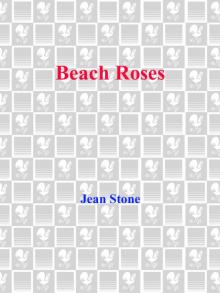 Beach Roses
Beach Roses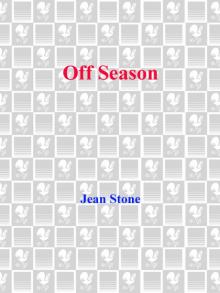 Off Season
Off Season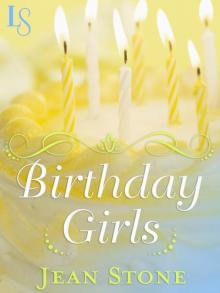 Birthday Girls
Birthday Girls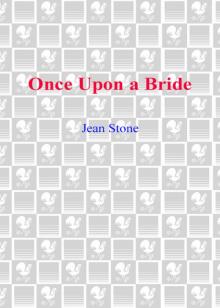 Once Upon a Bride
Once Upon a Bride Places by the Sea
Places by the Sea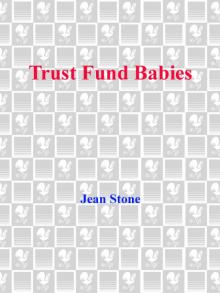 Trust Fund Babies
Trust Fund Babies The Summer House
The Summer House Tides of the Heart
Tides of the Heart Sins of Innocence
Sins of Innocence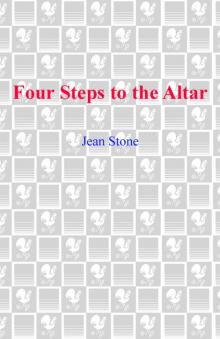 Four Steps to the Altar
Four Steps to the Altar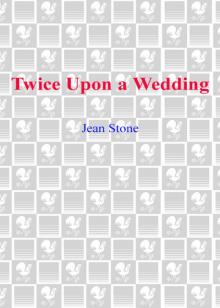 Twice Upon a Wedding
Twice Upon a Wedding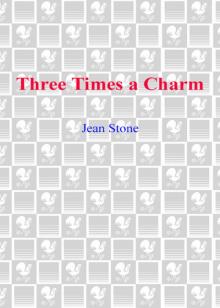 Three Times a Charm
Three Times a Charm